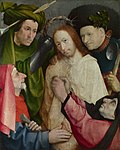Wikipedia:Main Page history/2020 April 10
From today's featured articleHygrophoropsis aurantiaca, the false chanterelle, is a species of fungus in the family Hygrophoropsidaceae. It is found across several continents, growing in woodland and heathland, and sometimes on woodchips used in gardening and landscaping. Its mushrooms are yellow-orange with a funnel-shaped cap up to 8 cm (3 1⁄8 in) across that has a felt-like surface. The thin, often forked gills on the underside of the cap run partway down the length of the otherwise smooth stalk. The mushroom can be mildly poisonous. Austrian naturalist Franz Xaver von Wulfen described the false chanterelle in 1781, noting both its resemblance to the true chanterelles and people's propensity to confuse them. The false chanterelle was then placed in the genus Clitocybe, but it was later observed that its forked gills and dextrinoid spores indicated a relationship to Paxillus. Genetic analysis has confirmed that it belongs to the order Boletales and is more closely related to boletes. (Full article...)
Recently featured:
Did you know ...
|
In the news
On this day
|
From today's featured list
As of 2019, Denmark has ten sites inscribed on the list of World Heritage Sites, and a further four on the tentative list. Selected by the United Nations Educational, Scientific and Cultural Organization (UNESCO), World Heritage Sites are places of importance to cultural or natural heritage as described in the UNESCO World Heritage Convention, established in 1972. Denmark ratified the convention on 25 July 1979, making its historical sites eligible for inclusion on the list. The first site in the country to be added to the list was the Jelling Mounds, Runic Stones and Church (pictured), inscribed at the 18th Session of the World Heritage Committee in 1994. Further sites were added in 1995, 2000, 2004, 2009, 2014, 2017, and 2018. Three sites, Kujataa, Aasivissuit – Nipisat, and Ilulissat Icefjord, are located in Greenland, an autonomous territory within the Kingdom of Denmark. Of the ten sites, seven are cultural and three are natural. (Full list...)
Today's featured picture

|
Christ Crucified is a 1780 oil-on-canvas painting of the crucifixion of Jesus by Spanish Romantic artist Francisco Goya. He presented it to the Real Academia de Bellas Artes de San Fernando as his reception piece to meet the requirements for admission. The painting is neoclassical in style and is similar to the treatment of the same topic by Velázquez and Anton Raphael Mengs. Goya conforms to the Spanish Baroque iconographic rules for portraying the Crucifixion as laid down by Francisco Pacheco – a black background, four rather than three nails, supported feet, and a trilingual inscription in Hebrew, Greek and Latin affixed to the top of the cross reading 'King of the Jews'. The work now forms part of the permanent collection of the Museo del Prado in Madrid. Painting credit: Francisco Goya |
Other areas of Wikipedia
- Community portal – Bulletin board, projects, resources and activities covering a wide range of Wikipedia areas.
- Help desk – Ask questions about using Wikipedia.
- Local embassy – For Wikipedia-related communication in languages other than English.
- Reference desk – Serving as virtual librarians, Wikipedia volunteers tackle your questions on a wide range of subjects.
- Site news – Announcements, updates, articles and press releases on Wikipedia and the Wikimedia Foundation.
- Village pump – For discussions about Wikipedia itself, including areas for technical issues and policies.
Wikipedia's sister projects
Wikipedia is hosted by the Wikimedia Foundation, a non-profit organization that also hosts a range of other projects:
Free media repository
Wiki software development
Wikimedia project coordination
Free textbooks and manuals
Free knowledge base
Free-content news
Collection of quotations
Free-content library
Directory of species
Free learning materials and activities
Free travel guide
Dictionary and thesaurus





